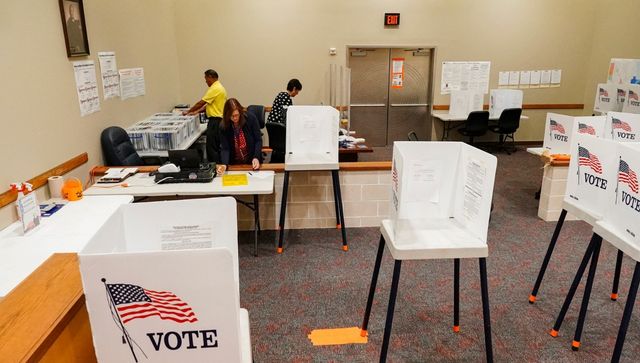If you are broadly aware that the upcoming midterm elections in the United States have major global implications, but you’re not up to speed on the American system of government or you’re having trouble following along, you’re in the right place. In the United States’ two-party system, control of two crucial bodies of government — the Senate and the House of Representatives — is essential for getting laws made, and it will be decided by a vote on 8 November. Democrats currently control both bodies and the presidency, and losing either the House or the Senate to Republicans would significantly decrease Democrats’ power in the next two years of President Joe Biden’s term. Hundreds of elections will take place, but many candidates are considered shoo-ins and control in each body will most likely be decided by a few tight races. I need the basics: What is decided in this election? The Senate, which is now at a 50-50 deadlock but is controlled by Democrats because Vice President Kamala Harris casts the tiebreaking vote, has 100 members, with two from each of the 50 states.
There are 34 seats up for grabs in November, and winners serve six-year terms.
The House, with 435 voting members, is controlled by the Democrats, 222-213. All 435 seats are up for election, with winners serving two-year terms. The odds are against Democrats, but this has been a strange year. Historically, the party that controls the presidency — currently the Democrats — has fared poorly in the midterms. Frustration with the president often leads to success for the other party, and Biden has low approval ratings. [caption id=“attachment_11536211” align=“alignnone” width=“640”] If Democrats lose either the Senate or the House of Representatives, it would reduce their powers. AP[/caption] Currently, Republicans are favored to win the House, and the Senate is considered a tossup, according to FiveThirtyEight. Democrats enjoyed a major polling bump after the Supreme Court made an unpopular ruling in June that removed the constitutional right to abortion, giving the party hope that it could defy historical trends, but that advantage has mostly faded. Why it matters: If Democrats lose control of either body, Biden’s agenda is in trouble In highly polarised times, it is exceedingly difficult to pass legislation unless one party controls the presidency, the House and the Senate. If Republicans win either the House or the Senate, they can prevent much of what Biden and the Democrats would hope to accomplish before 2024, the next presidential election. You could kiss any major Democratic legislation goodbye. On the other hand, if Democrats hold onto the House and increase their lead in the Senate, it could give them more ability to pass new laws. And, since senators serve six-year terms, running up a lead now would give them some breathing room in 2024, when analysts say Republicans are likely to be highly favored. If Republicans gain power, they could block Democratic efforts to codify abortion rights and take action on the climate, and question the aid sent to Ukraine. Republicans could gain investigative and impeachment powers If the Republicans take one or both of the chambers, they could use their new powers to create an onslaught of investigations into Democrats, as opposition parties have long done in Washington. With subpoenas and court hearings, they could highlight perceived incompetence or alleged wrongdoing on a variety of subjects, including the search of former
President Donald Trump ’s private club and residence in August, the withdrawal from Afghanistan and the pandemic response. Democrats expect that Biden and his family would be among the targets, along with Dr Anthony Fauci, a top medical adviser in the Trump and Biden administrations. Some Republicans have also pledged to impeach the president, a complicated process that could force Biden to stand trial in the Senate, as Trump did for separate impeachments in 2020 and 2021. Senator Ted Cruz, R-Texas, said last year that there would be “enormous pressure” on a Republican House to impeach Biden “whether it’s justified or not.” An important power of the Senate: Approving court nominations Control of the Senate includes the power to approve federal court justices, up to and including the Supreme Court. If Republicans claim control, they could use their power to block Biden’s nominations. [caption id=“attachment_11536231” align=“alignnone” width=“640”]
The Republicans are predicted to win the House in the US midterm elections. AP[/caption] When President Barack Obama, a Democrat, had to work with a Republican-controlled Senate, the Republicans blocked his Supreme Court nomination in 2016. But Trump was able to speed through three Supreme Court nominations, thanks to the friendly Senate. Though not as high-profile, lower-court nominations can also be highly influential. As president, both Trump and Biden have used same-party Senate control to appoint dozens of their preferred judges to important posts across the nation. State races could have a huge effect on issues such as abortion rights and voting A governor will be elected in 36 states.
Among other powers, they could be highly influential in determining whether abortion remains legal in several states.
The races for each state’s secretary of state do not usually receive much attention, but this year they have attracted major interest because of the office’s role in overseeing elections. It could become a key position if there are election disputes in the 2024 presidential election, and some of the Republicans running in key states supported Trump’s false claims that the 2020 election was stolen from him. Daniel Victor c.2022 The New York Times Company Read all the Latest News , Trending News , Cricket News , Bollywood News , India News and Entertainment News here. Follow us on Facebook, Twitter and Instagram


)

)
)
)
)
)
)
)
)



